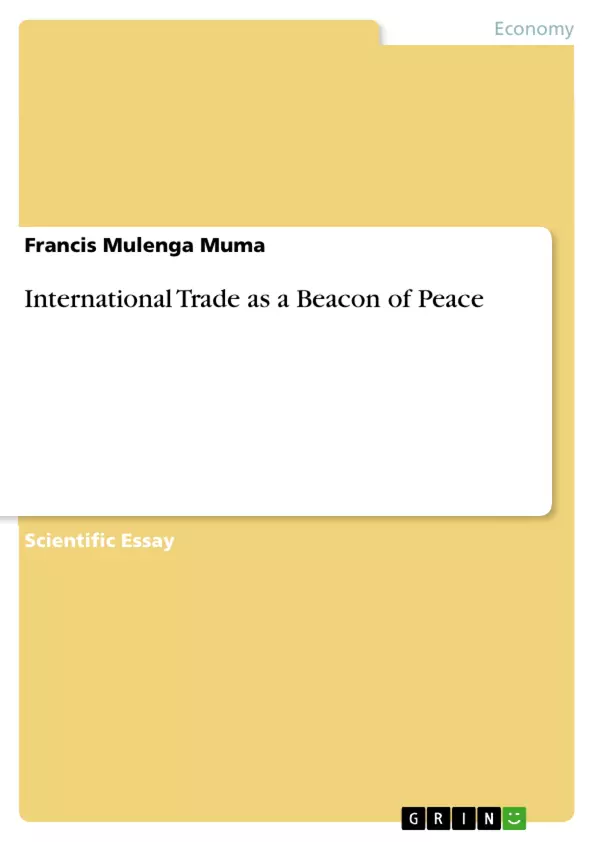Global peace is an ideal form of freedom, peace, harmonious atmosphere, and happiness among and within all nations and/or peoples.
Some new theories and issues concerning promotion of global peace are going on in the world today. Rather than world trade being dependent on world peace, as in the past, world peace and harmony may be influenced and brought nearer to reality through burgeoning world trade unlike in the past theories where trade was a function of global peace.
Inhaltsverzeichnis (Table of Contents)
- Introduction
- Globalization, Trade and Conflicts
- Trade and divergence
- Defining Peace: A Trade Theory Perspective
- Responsibility for Peace: A Lifelong Peace - Notions of a Stable Balance
- How Trade impacts on Conflict and Cooperation
- Economics Model of the "Peace-Through-Trade" Liberal Hypothesis
- Extensions of the Conflict-Trade Model
- Game-theory: Signaling Models
- Observations from the Trade-Conflict Model Regarding the Democratic Peace
- Foreign Direct Investment (FDI)
- Conclusion
- References
Zielsetzung und Themenschwerpunkte (Objectives and Key Themes)
This article aims to argue that international trade promotes peace, challenging the traditional view where trade is dependent on peace. It explores how trade fosters cooperation and reduces conflict between nations. Key themes covered in this paper include:- The relationship between trade and peace
- The role of international trade in fostering cooperation
- The impact of trade on conflict resolution
- The theoretical frameworks explaining the "peace-through-trade" hypothesis
- Empirical evidence supporting the positive correlation between trade and peace
Zusammenfassung der Kapitel (Chapter Summaries)
- Introduction: This chapter sets the stage by discussing the historical relationship between trade and peace. It also introduces the concept of globalization and its impact on trade and conflicts.
- Globalization, Trade and Conflicts: This section explores the complex relationship between globalization, trade, and conflicts. It analyzes how trade liberalization can lead to both positive and negative consequences in terms of conflict and cooperation.
- Trade and divergence: This chapter analyzes the phenomenon of trade divergence, where countries with different levels of economic development may experience unequal benefits from trade. It examines the potential implications for conflict and cooperation.
- Defining Peace: A Trade Theory Perspective: This chapter delves into the theoretical understanding of peace from a trade perspective. It explores different perspectives on how trade can contribute to a more peaceful world.
- Responsibility for Peace: A Lifelong Peace - Notions of a Stable Balance: This chapter discusses the various factors that contribute to a stable and peaceful balance in the international system. It examines the role of trade in maintaining this balance.
- How Trade impacts on Conflict and Cooperation: This chapter analyzes the direct impact of trade on conflict and cooperation. It explores how trade can serve as a tool for conflict resolution and as a catalyst for building positive relations between countries.
- Economics Model of the "Peace-Through-Trade" Liberal Hypothesis: This chapter presents the theoretical framework of the "peace-through-trade" hypothesis. It explains how increased trade between nations leads to greater economic interdependence and reduces the likelihood of conflict.
- Extensions of the Conflict-Trade Model: This chapter examines various extensions of the conflict-trade model, including game theory and signaling models. It explores how these models can help to understand the complex interactions between trade and conflict.
- Game-theory: Signaling Models: This chapter delves into the use of game theory models to analyze the relationship between trade and conflict. It explores how signaling models can help to explain how countries use trade as a means of signaling their intentions and reducing the risk of conflict.
- Observations from the Trade-Conflict Model Regarding the Democratic Peace: This chapter examines the implications of the trade-conflict model for the democratic peace theory. It explores how trade can promote peaceful relations between democratic countries.
- Foreign Direct Investment (FDI): This chapter discusses the role of foreign direct investment (FDI) in promoting peace. It examines how FDI can contribute to economic development, job creation, and cooperation between countries.
Schlüsselwörter (Keywords)
This paper explores the relationship between international trade and peace, focusing on the concept of "peace-through-trade" and analyzing the potential benefits of trade liberalization for global peace. Key terms and concepts covered include international trade, peace, cooperation, conflict, economic interdependence, foreign direct investment, and liberal international theory.Frequently Asked Questions
Does international trade promote global peace?
This article argues that burgeoning world trade can influence and bring global peace nearer to reality, challenging the older theory that trade is merely a function of existing peace.
What is the "Peace-Through-Trade" liberal hypothesis?
The hypothesis suggests that increased economic interdependence through trade makes conflict more costly and less likely, as nations rely on each other for prosperity.
How does Foreign Direct Investment (FDI) contribute to peace?
FDI promotes peace by fostering long-term economic development, creating jobs, and encouraging cooperation between the investing and host countries.
What role does globalization play in conflict resolution?
Globalization facilitates trade liberalization, which can serve as a catalyst for building positive international relations and providing tools for non-violent conflict resolution.
How is peace defined from a trade theory perspective?
From this perspective, peace is seen as a stable balance maintained through economic cooperation and the mutual benefits derived from an open international market.
Can trade lead to divergence and conflict?
The paper acknowledges trade divergence, where unequal economic benefits between nations might pose challenges to cooperation, requiring a stable balance to maintain peace.
- Quote paper
- Dr. Francis Mulenga Muma (Author), 2012, International Trade as a Beacon of Peace, Munich, GRIN Verlag, https://www.grin.com/document/198154



